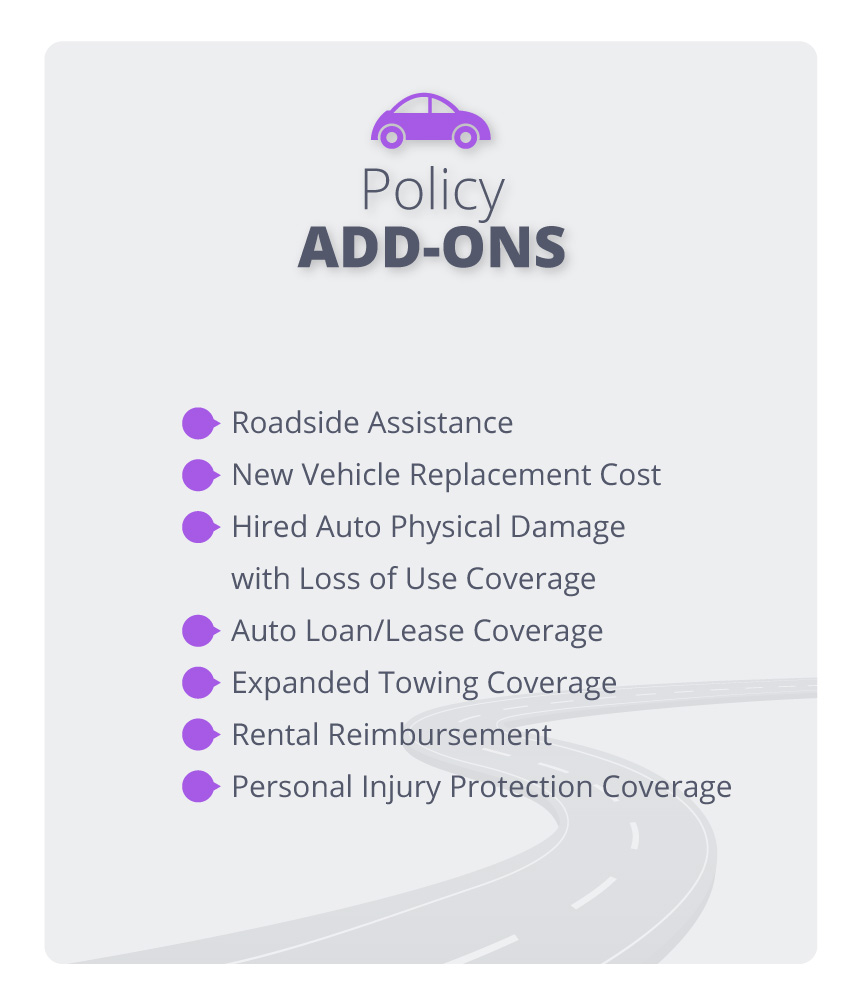
Commercial auto insurance in Virginia
Commercial auto insurance covers legal fees and other expenses if a business-owned vehicle is involved in an accident. All vehicles in Virginia must have auto liability insurance.
Who needs a commercial auto insurance policy in Virginia?
Any Virginia company that uses vehicles for business purposes must insure them appropriately. Commercial auto insurance covers vehicles owned by your business.
Your personal auto insurance policy covers you while driving to and from work, but not while making deliveries, picking up supplies, and other work-specific uses. A business auto policy would cover you and your personal vehicle in case you’re at fault for an accident during a work-related errand.
Any vehicles you own solely for work purposes must be covered by a commercial auto policy, whether you own a handyman pickup, a food truck, or a fleet of company cars.
What if I use my personal vehicle for work?
If you’re using your own vehicle for work-specific activities, your personal auto policy wouldn’t cover you in the case of an accident. That’s why many small business owners purchase hired and non-owned auto (HNOA) insurance. This liability policy covers accidents in personal, leased, and rented vehicles used for work purposes.
If you or an employee gets into an accident while driving a personal car for a work errand, your HNOA coverage would help pay for any claims or lawsuits against your business. However, this type of insurance will not cover damage to the vehicle used by your business.
Why is commercial auto insurance important?
Your business could be at risk of legal and financial jeopardy without commercial auto insurance coverage.
If one of your business vehicles is at fault in an accident, you could face an expensive judgment or settlement. You’d likely have to pay for damage to the other vehicle or property, medical costs, lost wages, pain and suffering, plus other related costs.
You could also face severe penalties for not carrying insurance. Your driving and vehicle registration privileges could be suspended and only be reinstated upon the payment of a statutory fee of $600, furnishing and maintaining proof of financial responsibility for three years, and potentially paying a reinstatement fee.

How does commercial vehicle insurance work in Virginia?
All vehicles in Virginia must be insured. Virginia's minimum auto liability insurance requirements are:
- $50,000 bodily injury liability per person
- $100,000 bodily injury liability per accident
- $25,000 property damage liability per accident
Vehicles owned by a business should be covered by commercial auto insurance, and personal vehicles driven for work should be covered by hired and non-owned auto (HNOA) insurance. An insurance agent might recommend higher coverage limits based on the types of vehicles you own and how they’re used.
Trucking businesses and other vehicles with a Virginia Department of Transportation serial number will have additional liability coverage requirements, depending on the type of vehicle and how it’s used.
You can see if your business needs these additional requirements by checking your U.S. Department of Transportation number or docket number with the Federal Motor Carrier Safety Administration.
How much does commercial auto insurance cost in Virginia?

Commercial auto insurance costs an average of $184 per month.
Your cost is based on a few factors, including:
- Number of vehicles
- Vehicle type and value
- Level of risk involved
- Claims history
- Employee driving records
- Policy deductible and limits
Verified business insurance reviews
Hear from customers like you who purchased small business insurance.
What else does commercial auto insurance cover?
While every Virginia business owner must meet the minimum requirements for business auto insurance, this mandate only applies to liability coverage. This can protect you if one of your vehicles causes an accident, but it does not insure you against a mishap caused by someone else.
It’s worth considering these other commercial auto coverage options to make sure you’re fully protected:
- Uninsured/underinsured motorist coverage insures you against personal injuries and damage involving a company vehicle, in case whoever caused the accident is unable to cover the full cost of damages.
- Medical payments coverage pays for medical expenses if employees and passengers are injured in a company-owned vehicle, regardless of who is at fault.
- Collision coverage helps pay for the cost of repairing or replacing your company vehicle if it’s damaged in an accident, regardless of who was at fault.
- Comprehensive coverage covers the costs of non-collision damages such as vandalism, theft, flood, or fire.
- Towing and labor coverage helps with the cost of roadside assistance for company-owned vehicles.
- Loading and unloading coverage insures against the damage of equipment and materials during transport, loading, or unloading.
- Bobtail coverage is recommended when you’re using tractors without a trailer. It usually covers the insured vehicle at all times, even during non-work-related uses.
- Personal injury protection (PIP) coverage helps cover necessary expenses after a car accident, such as medical bills. It is strongly recommended, but not required.

Get free auto insurance quotes and buy online with Insureon
Insureon makes it easy for business owners to get affordable Virginia commercial auto insurance, from Virginia Beach to Norfolk and beyond.
Complete one easy application to review commercial auto insurance quotes specific to your business and industry from leading U.S. insurance companies.
You can also speak to one of our licensed insurance agents if you have questions about auto or other types of business policies, such as general liability, commercial property, or workers' compensation insurance. They can assist with questions you may have about insurance eligibility or help you find the best commercial policies for your needs.

Want free expert advice right in your inbox?
By entering your email address and subscribing, you agree to our Terms of Use and Privacy Policy
